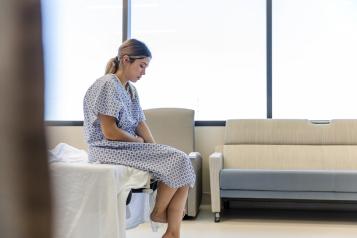From hospital to home: Improving patient discharge

In 2023, our research found worrying problems with people's experiences of hospital discharge. People told us the NHS didn't give them the proper support or information.
Two years later, our review of people's experiences of hospital discharge indicates that many of the same problems are still occurring.
Against the backdrop of NHS hospital trusts declaring critical incidents this winter due to the increased demand on emergency departments, we are calling for the NHS to do more to follow existing guidance.
This article looks at
Topics covered by this six-minute read include:
Why safe hospital discharge matters
When the NHS correctly discharges patients from a hospital to their homes or another care facility, it can aid their recovery and free up beds for new patients.
But for this to happen, hospitals are supposed to ensure that patients:
- are medically fit to leave the hospital
- have the information they need
- have any care and support they need in place
- are involved in the planning.
However, getting the discharge process wrong causes problems for both the patient and services. If patients are discharged too early without proper support, they may need to be readmitted to hospital or seek help from GPs or pharmacies.
Meanwhile, delays in discharging medically fit people create issues for new patients needing beds, leading to longer wait times in A&E and treatment in corridors until beds are available.
Recent NHS statistics show that around 87% of patients are discharged on the date that the hospital believes they are ready. Of the 13% who experience a delay, most only have a one- or two-day delay. However, in November 2024, 6,872 people experienced a delay of one to two weeks, and 2,484 people were waiting for discharge for over three weeks.
The importance of being involved in plans
NHS guidance on hospital discharge states that the NHS should support patients and their relatives and carers in making fully informed decisions about the care and support they receive on discharge from a hospital, where appropriate.
However, people have told us about not being involved in discharge planning and the inappropriate decisions this can result in. Examples include:
- Hospital staff taking patients with dementia at their word when they say they don't need support at home.
- Relatives not being consulted about moving patients to care homes when care packages were already in place.
- Hospitals assuming relatives could care for patients on discharge or transport patients home without checking first.
"The client has cared for his mum for over two years at home and has a care package set up for her. His mum had a fall three weeks ago and went into hospital to have an x-ray to make sure all was ok. She was kept in for observation. Last Thursday an assessment was done on his mum and a social worker called to say that he needed to find a care home for his mum as she was ready to be discharged but couldn't return home. The next day the social worker called back and told him they'd found a care home, and she would be sent there on Sunday. The client feels this has been decided in haste and his mum assessed when she was in a stressed, upset and confused state in unfamiliar surroundings which would've had an impact on the score she got in the assessment. He wanted his mum to return home, get settled back into her routine and then be assessed." - Story shared by Healthwatch Rotherham.
The consequences of poor timing
NHS discharge guidance states that people should be discharged to the right place, at the right time, with the proper support to maximise their independence and lead to the best possible outcomes.
However, we have heard about people leaving hospitals without everything in place. People have told us the NHS has discharged them:
- Before seeing a consultant
- Before being properly diagnosed
- Without any follow-up care in place
- Without medication or information about how to manage at home.
As a result, some people experienced severe consequences, including further medical complications. In some cases, the NHS had to readmitted people to the hospital.
"Someone called to ask for support as to how to make a complaint. A 70-year-old relative had had heart surgery and was discharged without any advice. Once home, they suffered chest pain and blacked out. The family returned the patient to A&E to be advised there weren't any beds available and that they should to go home and speak to their GP. The GP advised to go back to A&E as they weren't a cardio specialist. Currently the patient was at the relative's home address unwell." - Story shared with Healthwatch North Lincolnshire.
In other cases, people described their discharge as delayed as they had to chase up the hospital for information on self-care and medication or because they were waiting for social care. This can have knock-on consequences.
"A family member was discharged three weeks ago after a colostomy reversal. He waited HOURS because there was a delay with the pharmacy supplying his medications to take home. So, family members and the nursing staff on the ward had to repeatedly phone the on-site pharmacy to find out when the tablets would be ready. This is an ongoing problem at this hospital and inconveniences the patient and their relatives and presumably means the bed was blocked from being used by another patient. He had to wait on the ward and not in a discharge lounge. It also costs relatives a large amount in car parking charges." - Story shared with Healthwatch England.
The importance of clear information
People have told us about being given poor or limited discharge information on how to cope once at home and how to care for themselves. We heard about:
- Information that was inappropriate to their needs or made outdated assumptions.
- A lack of or limited information on administering medication by injection or changing catheters.
- Discharge letters that gave inaccurate information about someone's condition.
"My parent had a cardiology operation. Whilst the hospital gave information about recovery there was no female specific information. Someone in the next bed told us that chest bandages are not designed for women, and it is important to get the right sort of bra, so it doesn't damage the stitches. It would have been better for this information to come from the hospital in form of recovery videos e.g. on bathing, hair washing and noticing signs of infection. The written information talked about when men might return to fly fishing and women to household tasks. The hospital warned us that my parent might suffer from depression afterwards, but they could expand on ways of dealing with this." - Story shared by Healthwatch Warwickshire.
The impact of a good experience
A recent report by Healthwatch Oxfordshire highlights the benefits of a good hospital discharge approach. The research found that people value support and care from health professionals, good communication, being involved in decision-making, and effective follow-up and aftercare.
We have also heard positive stories about good discharge practices, with some people telling us about receiving:
- Appropriate and helpful information on how to care for themselves.
- The post-discharge support they need, including equipment to help cope at home and visits from community teams.
- Support from voluntary organisations, including a home visit on the day of discharge.
"Received Red Cross call on discharge, where they were given contact details for further help and advice needed. They were asked if there was anything they needed at that stage, which was a massive support for them. They have a direct dial number for the unit at the hospital and know to call there if needed, and also know that they can call on the Red Cross for support/aids for home mobility. The comment was, 'The service from NHS has been outstanding'". - Story shared with Healthwatch Hull.
Steps that will improve hospital discharge
Current winter pressures and the high demand for hospital beds result from multiple factors affecting NHS and social care teams. However, several steps could help ensure more people have a safer hospital discharge experience.
- Follow existing guidance: NHS England's next Urgent and Emergency Care Recovery Plan should ensure that Integrated Care Boards (ICBs) ensure that services follow existing hospital discharge guidance. This guidance includes:
- Supporting people in making informed choices by providing contact information and advice and asking about transport home.
- Signposting to support services, including voluntary organisations and services that support unpaid carers.
- Having clear responsibility for who will arrange people's transport home, with dedicated staff in place to make travel arrangements.
- Providing a point of contact for people to use if their condition worsens.
- Involving family and carers in decisions about someone's discharge.
- Review secondary care workforce: ICBs should also focus on workforce solutions in secondary care. This includes reviewing staff retention policies and developing plans to increase the capacity of administrative staff in local NHS trusts. These staff can act as points of contact for those entering and leaving a hospital and support the work of 'transfer of care' hubs.
- More resources for social care: The government has announced plans to review social care challenges. However, in the short term, more resources are needed to ensure that councils and providers have the necessary staff, skills, and resources to support individuals in living independently. This includes providing reablement support at home or in residential care after discharge from the hospital.
- Better data on hospital discharge: To ensure people are not rushed out of hospital when they're not ready and that processes are working for patients, we are calling on the NHS to restart the collection of daily emergency readmissions data and publish this data monthly. Minimum standards on transport waiting times and post-discharge contact times should also be introduced.


